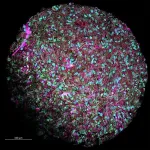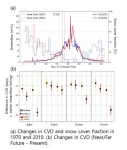(Press-News.org) A “biocomputer” powered by human brain cells could be developed within our lifetime, according to Johns Hopkins University researchers who expect such technology to exponentially expand the capabilities of modern computing and create novel fields of study.
The team outlines their plan for “organoid intelligence” today in the journal Frontiers in Science.
“Computing and artificial intelligence have been driving the technology revolution but they are reaching a ceiling,” said Thomas Hartung, a professor of environmental health sciences at the Johns Hopkins Bloomberg School of Public Health and Whiting School of Engineering who is spearheading the work. “Biocomputing is an enormous effort of compacting computational power and increasing its efficiency to push past our current technological limits.”
For nearly two decades scientists have used tiny organoids, lab-grown tissue resembling fully grown organs, to experiment on kidneys, lungs, and other organs without resorting to human or animal testing. More recently Hartung and colleagues at Johns Hopkins have been working with brain organoids, orbs the size of a pen dot with neurons and other features that promise to sustain basic functions like learning and remembering.
“This opens up research on how the human brain works,” Hartung said. “Because you can start manipulating the system, doing things you cannot ethically do with human brains.”
Hartung began to grow and assemble brain cells into functional organoids in 2012 using cells from human skin samples reprogrammed into an embryonic stem cell-like state. Each organoid contains about 50,000 cells, about the size of a fruit fly’s nervous system. He now envisions building a futuristic computer with such brain organoids.
Computers that run on this “biological hardware” could in the next decade begin to alleviate energy-consumption demands of supercomputing that are becoming increasingly unsustainable, Hartung said. Even though computers process calculations involving numbers and data faster than humans, brains are much smarter in making complex logical decisions, like telling a dog from a cat.
“The brain is still unmatched by modern computers,” Hartung said. “Frontier, the latest supercomputer in Kentucky, is a $600 million, 6,800-square-feet installation. Only in June of last year, it exceeded for the first time the computational capacity of a single human brain — but using a million times more energy.”
It might take decades before organoid intelligence can power a system as smart as a mouse, Hartung said. But by scaling up production of brain organoids and training them with artificial intelligence, he foresees a future where biocomputers support superior computing speed, processing power, data efficiency, and storage capabilities.
“It will take decades before we achieve the goal of something comparable to any type of computer,” Hartung said. “But if we don't start creating funding programs for this, it will be much more difficult.”
Organoid intelligence could also revolutionize drug testing research for neurodevelopmental disorders and neurodegeneration, said Lena Smirnova, a Johns Hopkins assistant professor of environmental health and engineering who co-leads the investigations.
“We want to compare brain organoids from typically developed donors versus brain organoids from donors with autism,” Smirnova said. “The tools we are developing towards biological computing are the same tools that will allow us to understand changes in neuronal networks specific for autism, without having to use animals or to access patients, so we can understand the underlying mechanisms of why patients have these cognition issues and impairments.”
To assess the ethical implications of working with organoid intelligence, a diverse consortium of scientists, bioethicists, and members of the public have been embedded within the team.
Johns Hopkins authors included: Brian S. Caffo, David H. Gracias, Qi Huang, Itzy E. Morales Pantoja, Bohao Tang, Donald J. Zack, Cynthia A. Berlinicke, J. Lomax Boyd, Timothy DHarris, Erik C. Johnson, Jeffrey Kahn, Barton L. Paulhamus, Jesse Plotkin, Alexander S. Szalay, Joshua T. Vogelstein, and Paul F. Worley.
Other authors included: Brett J. Kagan, of Cortical Labs; Alysson R. Muotri, of the University of California San Diego; and Jens C. Schwamborn of University of Luxembourg.
IMAGES: Top: Thomas Hartung with brain organoids in his lab at the Johns Hopkins Bloomberg School of Public Health. Credit: Will Kirk/Johns Hopkins University. Bottom: A close-up of a brain organoid. Credit: Jesse Plotkin/Johns Hopkins University. High resolution images available.
###
Johns Hopkins University news releases are available online, as is information for reporters. To arrange an interview with a Johns Hopkins expert, contact a media representative listed above. Find more Johns Hopkins experts on the Experts Hub, and more Johns Hopkins stories on the Hub.
END
Amongst healthcare professionals, the feeling of being supported in the workplace can protect them against adverse mental health and burnout, according to a new study published in CMAJ Open by researchers at Queen Mary University of London and medical staff at various hospitals across the UK.
CoPE-HCP study was designed, during the early part of COVID-19 pandemic, when there was great concern for the mental health of healthcare professionals with no scientifically-proven mitigating strategies to reduce that impact. Funded by Barts Charity, this new longitudinal study found that feeling unsupported ...
LA JOLLA, CA—A clinical trial carried out at Scripps Research has shown that apremilast, approved by the U.S. Food and Drug Administration (FDA) for the treatment of psoriasis, cuts alcohol intake by more than half in people with severe alcohol use disorder (AUD). Collaborators at Oregon Health and Science University (OHSU) and other institutions also showed that, in mice, apremilast boosts activity in an area of the brain known to be involved in AUD.
The research was published online ahead of ...
LA JOLLA, CA—The National Institute on Alcohol Abuse and Alcoholism (NIAAA) has awarded scientists at Scripps Research a $10 million grant to study the cellular and molecular changes in the brain that underlie alcohol use disorder (AUD). The grant will fund the Scripps Research Alcohol Research Center (TSRI-ARC) for five years, carrying the research into its 50th year of consecutive NIAAA funding—first beginning in 1977.
“A lot of exciting things have happened in the AUD field over the last 45 years, and the center has been at the forefront of many of them,” ...
New research published in Diabetologia (the journal of the European Association for the Study of Diabetes [EASD]) is the first study to show that childhood obesity is associated with an increased risk of four of the five recently proposed subtypes of adult-onset diabetes. The study is by Yuxia Wei, Institute of Environmental Medicine, Karolinska Institutet, Stockholm, Sweden, and colleagues.
In 2018, a ground-breaking study identified five novel subtypes of adult-onset diabetes: severe autoimmune diabetes (SAID, including type 1 diabetes and latent autoimmune diabetes in adults [LADA]) and four ...
Nature has remained in balance for a long time, but climate change due to modern human activities is disrupting the balance of the natural system. The disruption makes it more difficult for humans – who must work with nature to survive – to predict the future. Moreover, developing countries with limited understanding and preparation for climate change are more vulnerable to climate change-driven social and economic damage. Recently, a research team from POSTECH corrected the biases of future regional climate model projection data to ...
Eliminating animal milk alone from the diet of adults with eosinophilic esophagitis, or EoE, is as effective at treating the disease as eliminating animal milk plus five other common foods, a clinical trial funded by the National Institutes of Health has found. For people with EoE whose disease remains active after they forgo animal milk, a more restrictive diet may help them achieve remission, according to the researchers. These findings were published today in the journal The Lancet Gastroenterology & Hepatology.
“Diet-based therapy for eosinophilic esophagitis will be much ...
Are our pets leaking information about us?
Pet and animal-related apps are creating cybersecurity risks to their owners, new research has shown.
While being able to trace your cat and dog may be an attractive benefit to many pet owners as it can provide peace of mind, allowing a third party to track your movements may be much less attractive.
Computer scientists at Newcastle University and Royal Holloway, University of London have exposed multiple security and privacy issues by evaluating 40 popular Android apps for pets and other companion animals as well as farm animals. The results show that several of these apps ...
Leading environmental health experts have called for a comprehensive review of the UK's fire safety regulations, with a focus on the environmental and health risks of current chemical flame retardants.
The health dangers of substances meant to improve fire safety have prompted experts to demand a range of new measures to reduce risk.
Flame retardants are widely used to slow down or stop the spread of fire. They are used regularly in a range of products – from sofas and textiles, to building materials. However, hundreds of studies have reported on the adverse effects of these chemicals, many of which are bioaccumulative and have been linked ...
Loneliness can often contribute to depression in expectant and new mothers, finds a new review of evidence led by UCL researchers.
The researchers say people working with expectant mothers, such as in antenatal classes or consultations, should be aware of the importance of loneliness and the value of encouraging new mothers to develop and maintain good social connections. The findings suggest that increased support from family and healthcare professionals can be helpful in reducing the mental health impacts of loneliness.
Published in BMC Psychiatry, the meta-synthesis (an evidence review using a systematic ...
Maternal obesity alters the structure of the placenta (a vital organ that nourishes the baby during pregnancy) more than gestational diabetes mellitus (GDM; a condition is diagnosed by poor glucose control in pregnancy). The new insight, published in The Journal of Physiology, enhances understanding about the mechanisms underlying poor pregnancy outcomes and the subsequent greater risk of poor neonatal and offspring health. The identification of specific changes in the placenta could lead to the potential development ...



